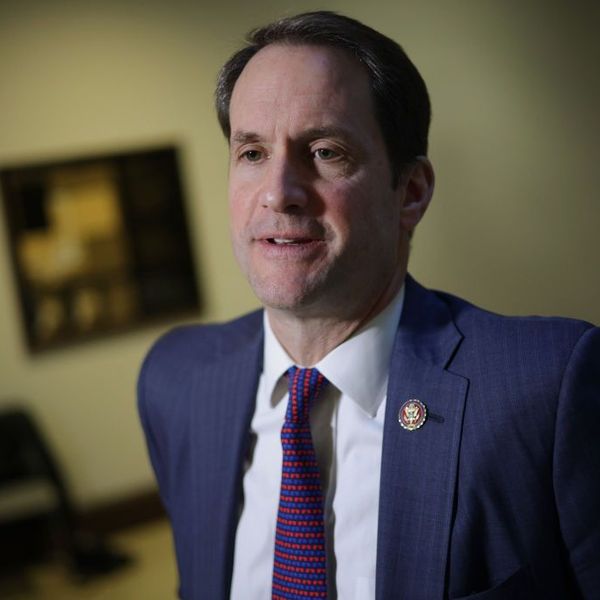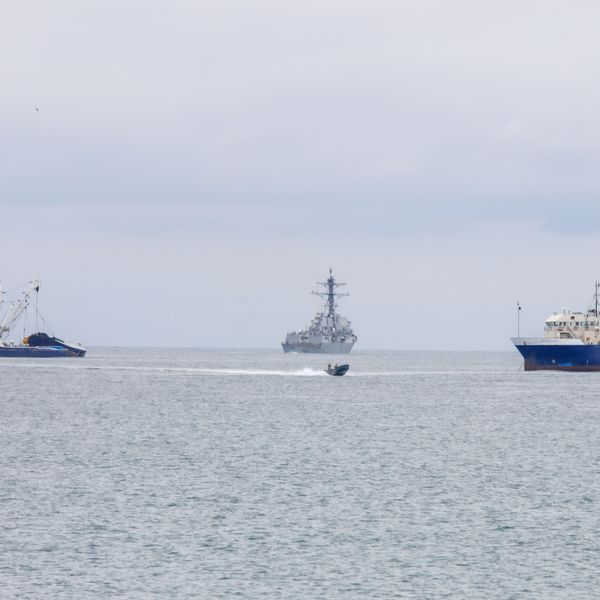
A Chinese balloon flies above Charlotte, North Carolina on February 4, 2023.
US Military Shoots Down China's Balloon Off South Carolina Coast
The Associated Press reported that "an operation was underway in U.S. territorial waters to recover debris from the balloon."
The United States military shot down a Chinese balloon off the South Carolina coast on Saturday, according to the Associated Press.
"An operation was underway in U.S. territorial waters to recover debris from the balloon, which had been flying at about 60,000 feet and estimated to be about the size of three school buses," AP reported. "Before the downing, President Joe Biden had said earlier Saturday, 'We're going to take care of it,' when asked by reporters about the balloon. The Federal Aviation Administration and Coast Guard worked to clear the airspace and water below."
Defense Secretary Lloyd Austin confirmed in a statement that "at the direction of President Biden, U.S. fighter aircraft assigned to U.S. Northern Command" successfully downed the balloon "off the coast of South Carolina in U.S. airspace."
The U.S. has said it believes the high-altitude balloon was a part of a surveillance operation, something China has denied.
"The airship is from China," a spokesperson for the country's foreign ministry said Friday. "It is a civilian airship used for research, mainly meteorological, purposes. The Chinese side regrets the unintended entry of the airship into U.S. airspace due to force majeure. The Chinese side will continue communicating with the U.S. side and properly handle this unexpected situation."
The U.S. first detected the balloon over the state of Montana earlier in the week, leading Secretary of State Antony Blinken to cancel his planned trip to China as tensions between the two countries continue to rise.
As Jake Werner of the Quincy Institute for Responsible Statecraft wrote Friday, members of Congress have "used the incident to hype fears about China," citing House China Select Committee Chairman Mike Gallagher's (R-Wis.) claim that the balloon posed "a threat to American sovereignty" and "a threat to the Midwest."
Werner stressed that "foreign surveillance of sensitive U.S. sites is not a new phenomenon," nor is "U.S. surveillance of foreign countries."
"The toxic politics predominating in Washington seems to have convinced the Biden administration to further restrict communications with Beijing by calling off Blinken's trip," Werner added. "Letting war hawks set America's agenda on China can only end in disaster. Conflict is not inevitable, but avoiding a disastrous U.S.-China military confrontation will require tough-minded diplomacy—not disengagement."
An Urgent Message From Our Co-Founder
Dear Common Dreams reader, The U.S. is on a fast track to authoritarianism like nothing I've ever seen. Meanwhile, corporate news outlets are utterly capitulating to Trump, twisting their coverage to avoid drawing his ire while lining up to stuff cash in his pockets. That's why I believe that Common Dreams is doing the best and most consequential reporting that we've ever done. Our small but mighty team is a progressive reporting powerhouse, covering the news every day that the corporate media never will. Our mission has always been simple: To inform. To inspire. And to ignite change for the common good. Now here's the key piece that I want all our readers to understand: None of this would be possible without your financial support. That's not just some fundraising cliche. It's the absolute and literal truth. We don't accept corporate advertising and never will. We don't have a paywall because we don't think people should be blocked from critical news based on their ability to pay. Everything we do is funded by the donations of readers like you. Will you donate now to help power the nonprofit, independent reporting of Common Dreams? Thank you for being a vital member of our community. Together, we can keep independent journalism alive when it’s needed most. - Craig Brown, Co-founder |
The United States military shot down a Chinese balloon off the South Carolina coast on Saturday, according to the Associated Press.
"An operation was underway in U.S. territorial waters to recover debris from the balloon, which had been flying at about 60,000 feet and estimated to be about the size of three school buses," AP reported. "Before the downing, President Joe Biden had said earlier Saturday, 'We're going to take care of it,' when asked by reporters about the balloon. The Federal Aviation Administration and Coast Guard worked to clear the airspace and water below."
Defense Secretary Lloyd Austin confirmed in a statement that "at the direction of President Biden, U.S. fighter aircraft assigned to U.S. Northern Command" successfully downed the balloon "off the coast of South Carolina in U.S. airspace."
The U.S. has said it believes the high-altitude balloon was a part of a surveillance operation, something China has denied.
"The airship is from China," a spokesperson for the country's foreign ministry said Friday. "It is a civilian airship used for research, mainly meteorological, purposes. The Chinese side regrets the unintended entry of the airship into U.S. airspace due to force majeure. The Chinese side will continue communicating with the U.S. side and properly handle this unexpected situation."
The U.S. first detected the balloon over the state of Montana earlier in the week, leading Secretary of State Antony Blinken to cancel his planned trip to China as tensions between the two countries continue to rise.
As Jake Werner of the Quincy Institute for Responsible Statecraft wrote Friday, members of Congress have "used the incident to hype fears about China," citing House China Select Committee Chairman Mike Gallagher's (R-Wis.) claim that the balloon posed "a threat to American sovereignty" and "a threat to the Midwest."
Werner stressed that "foreign surveillance of sensitive U.S. sites is not a new phenomenon," nor is "U.S. surveillance of foreign countries."
"The toxic politics predominating in Washington seems to have convinced the Biden administration to further restrict communications with Beijing by calling off Blinken's trip," Werner added. "Letting war hawks set America's agenda on China can only end in disaster. Conflict is not inevitable, but avoiding a disastrous U.S.-China military confrontation will require tough-minded diplomacy—not disengagement."
- Pentagon Confirms It Shot Down 'Object' 40,000 Feet Over Alaska ›
- Opinion | US Media 'Spy Balloon' Obsession a Gift to China Hawks | Common Dreams ›
- Opinion | Biden Embraces Autocracies and Deteriorating Democracies to Challenge China | Common Dreams ›
- Opinion | The US Mainstream Media Beats the China War Drums | Common Dreams ›
The United States military shot down a Chinese balloon off the South Carolina coast on Saturday, according to the Associated Press.
"An operation was underway in U.S. territorial waters to recover debris from the balloon, which had been flying at about 60,000 feet and estimated to be about the size of three school buses," AP reported. "Before the downing, President Joe Biden had said earlier Saturday, 'We're going to take care of it,' when asked by reporters about the balloon. The Federal Aviation Administration and Coast Guard worked to clear the airspace and water below."
Defense Secretary Lloyd Austin confirmed in a statement that "at the direction of President Biden, U.S. fighter aircraft assigned to U.S. Northern Command" successfully downed the balloon "off the coast of South Carolina in U.S. airspace."
The U.S. has said it believes the high-altitude balloon was a part of a surveillance operation, something China has denied.
"The airship is from China," a spokesperson for the country's foreign ministry said Friday. "It is a civilian airship used for research, mainly meteorological, purposes. The Chinese side regrets the unintended entry of the airship into U.S. airspace due to force majeure. The Chinese side will continue communicating with the U.S. side and properly handle this unexpected situation."
The U.S. first detected the balloon over the state of Montana earlier in the week, leading Secretary of State Antony Blinken to cancel his planned trip to China as tensions between the two countries continue to rise.
As Jake Werner of the Quincy Institute for Responsible Statecraft wrote Friday, members of Congress have "used the incident to hype fears about China," citing House China Select Committee Chairman Mike Gallagher's (R-Wis.) claim that the balloon posed "a threat to American sovereignty" and "a threat to the Midwest."
Werner stressed that "foreign surveillance of sensitive U.S. sites is not a new phenomenon," nor is "U.S. surveillance of foreign countries."
"The toxic politics predominating in Washington seems to have convinced the Biden administration to further restrict communications with Beijing by calling off Blinken's trip," Werner added. "Letting war hawks set America's agenda on China can only end in disaster. Conflict is not inevitable, but avoiding a disastrous U.S.-China military confrontation will require tough-minded diplomacy—not disengagement."
- Pentagon Confirms It Shot Down 'Object' 40,000 Feet Over Alaska ›
- Opinion | US Media 'Spy Balloon' Obsession a Gift to China Hawks | Common Dreams ›
- Opinion | Biden Embraces Autocracies and Deteriorating Democracies to Challenge China | Common Dreams ›
- Opinion | The US Mainstream Media Beats the China War Drums | Common Dreams ›

